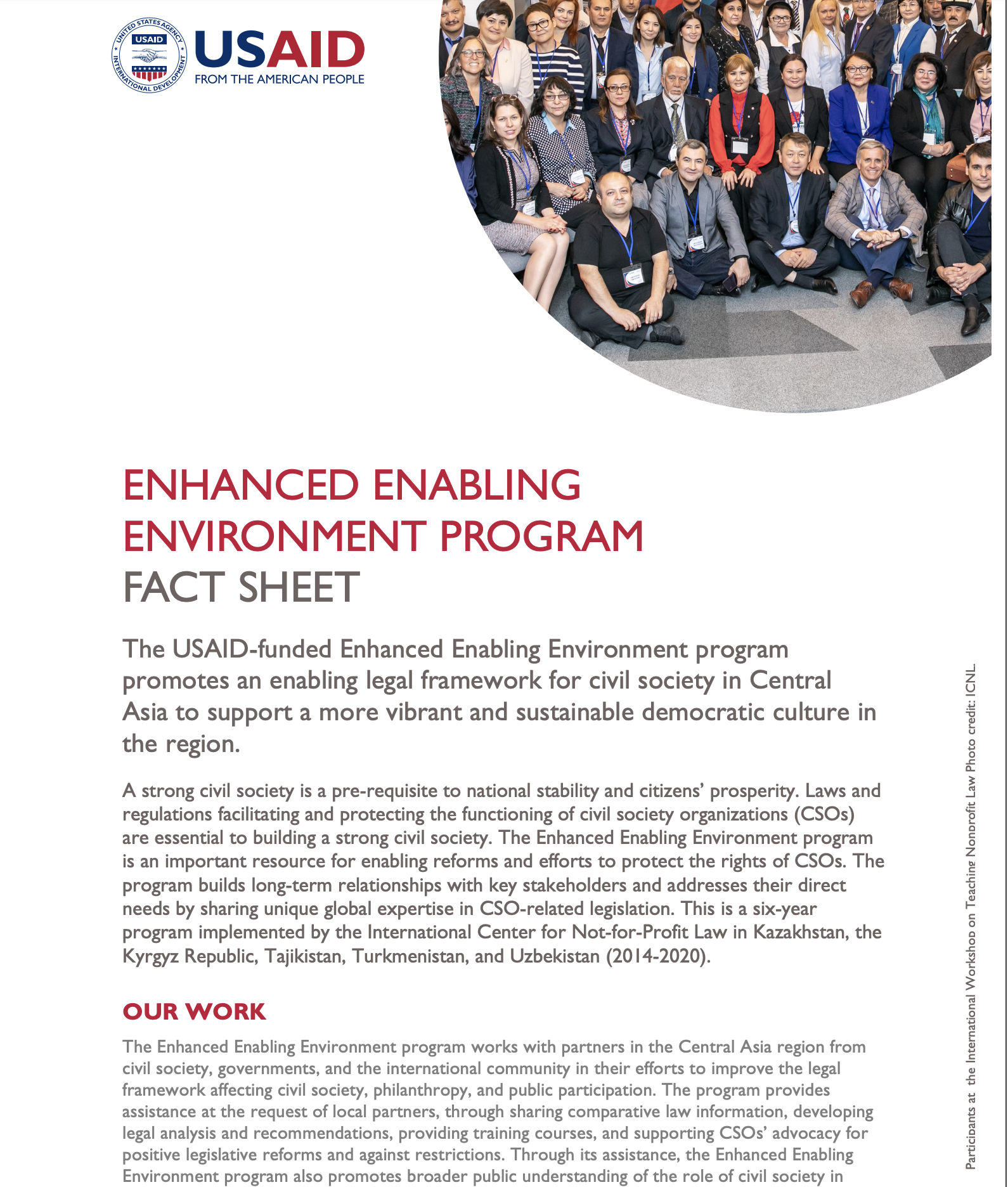Speeches Shim
Enhanced Enabling Environment Program ![]() (pdf - 3 MB)
(pdf - 3 MB)
The USAID-funded Enhanced Enabling Environment program promotes an enabling legal framework for civil society in Central Asia to support a more vibrant and sustainable democratic culture in the region.
A strong civil society is a pre-requisite to national stability and citizens’ prosperity. Laws and regulations facilitating and protecting the functioning of civil society organizations (CSOs) are essential to building a strong civil society. The Enhanced Enabling Environment program is an important resource for enabling reforms and efforts to protect the rights of CSOs. The program builds long-term relationships with key stakeholders and addresses their direct needs by sharing unique global expertise in CSO-related legislation. This is a six-year program implemented by the International Center for Not-for-Profit Law in Kazakhstan, the Kyrgyz Republic, Tajikistan, Turkmenistan, and Uzbekistan (2014-2020).
Our Work
The Enhanced Enabling Environment program works with partners in the Central Asia region from civil society, governments, and the international community in their efforts to improve the legal framework affecting civil society, philanthropy, and public participation. The program provides assistance at the request of local partners, through sharing comparative law information, developing legal analysis and recommendations, providing training courses, and supporting CSOs’ advocacy for positive legislative reforms and against restrictions. Through its assistance, the Enhanced Enabling Environment program also promotes broader public understanding of the role of civil society in democracy and the importance of local ownership in all decision making related to law reforms and public participation.
Our Impact
Since 2014, the Enhanced Enabling Environment program assisted local partners with the adoption of 19 laws and regulations that improve the CSO enabling environment, while helping to prevent the adoption of over 12 restrictive initiatives. In addition, the program rendered over 7,200 consultations and provided over 100 internal compliance assessments to civil society actors, helping them defend their legal rights and improve legal knowledge. The Enhanced Enabling Environment program distributed over 130,000 materials, including copies of laws, regulations, analyses, comparative reviews, and other materials that strengthen local partners’ legal knowledge and promote their engagement in law reforms. Over 400 lawyers specializing in assistance to CSOs received professional support from the program, improving the quality of assistance to CSOs. The Enhanced Enabling Environment program has worked with universities and professors throughout the Central Asia region to support teaching CSO law courses.
The Enhanced Enabling Environment program directly supported local partners with:
- Promoting the adoption of four restrictive initiatives in the Kyrgyz Republic, including a draft law on “foreign agents” that would have restricted CSOs’ access to foreign funding.
- Simplifying reporting requirements to Kazakhstan’s CSO database, thereby reducing CSOs’ administrative burdens and strengthening sustainability.
- Establishing and improving new legal mechanisms of state support to CSOs, such as a state grant and award mechanism, contributing to improved CSO sustainability in Kazakhstan.
- Establishing and supporting implementation of a new “public councils” mechanism in Kazakhstan, which enhances citizen oversight of state budgets and participation in state decision making.
- Improving government transparency and access to information through the adoption of the Law on Access to Information in Kazakhstan.
- Promoting civil society’s engagement with Central Asian governments in preventing terrorist financing abuse of the CSO sector, leading to the development of a model risk assessment methodology in the Kyrgyz Republic that complies with global best practices and avoids undue restrictions on civil society.
- Replacing a draft law’s burdensome procedure for registering foreign grants with a simple notification procedure in Tajikistan.
- Organizing a study visit to Washington, D.C. for 20 representatives of CSOs, legislative bodies, and governments to research U.S. mechanisms for CSO-government cooperation and CSO accountability, resulting in improved CSO-government dialogue and cooperation on law reforms.


Comment
Make a general inquiry or suggest an improvement.